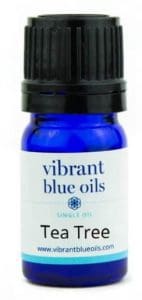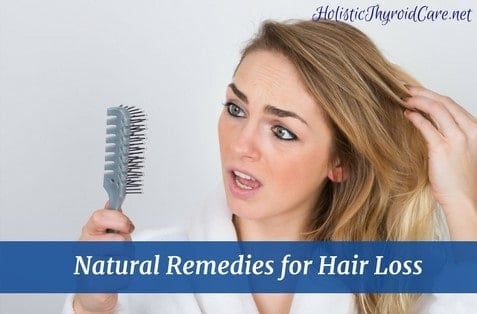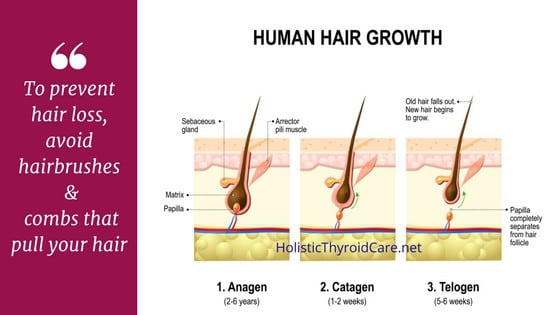Hair loss afflicts everyone. As a matter of fact, all of us normally lose up to 100 hairs every day. About the same amount usually grows back again – or so we hope. Actual hair loss occurs when hair fails to replace itself or when an excessive amount falls out. Women often lose hair during menopause or after childbirth. However, when hair loss is inherited, as is the case with male-patterned baldness, it usually cannot be reversed, except by surgical transplant.
Thyroid dysfunction can contribute to hair loss as well as other factors such as adrenal dysfunction, chemotherapy, mineral or vitamin deficiencies, scalp infections, arsenic, thallium, or lead poisoning, and infections accompanied by a high fever.
In most cases, once the dysfunction or underlying toxicity or infection has been corrected, hair loss and hair regrowth rates normalize.
Whether caused by genetic or environmental factors, though, natural remedies can reverse further hair loss and also enhance hair health. To be safe, however, any sudden hair loss should be checked out by a physician.
Adrenal Deficiency and Hair Loss
Since the adrenal glands produce androgens, which are hormones essential to inducing hair growth, adrenal fatigue or dysfunction can lead to hair loss and the underlying cause may be related to stress.
The adrenal glands also produce the stress hormone known as adrenaline, so prolonged stress in adrenal fatigue /adrenal exhaustion lead to a reduction in hair growth.
In some instances, a change in thyroid medication (brand or dosage) can tax the adrenals just enough to cause hair loss. It’s common for people to believe it’s the thyroid medication in and of itself, but in reality, it’s a reflection of progressing adrenal fatigue that hasn’t been addressed appropriately. In this scenario, thyroid medication may be a “stressor” for the adrenal glands.
Licorice, Siberian ginseng, ginseng, and ashwagandha are herbs that help keep the adrenal glands functioning efficiently.
What You Can Do
The first step for basic hair care is to use a very mild shampoo and avoid blow-drying your hair on the hottest setting.
Also, avoid permanents, dyes, frequent use of a curling or flat iron, hot rollers, or tying your hair too tightly in a ponytail or hair combs, as all these things can damage fragile hair.
Eat a diet rich in vegetables and fruits because vitamin and mineral deficiencies, especially a lack of iron and zinc, can lead to hair loss. If you notice excessive hair loss, see your doctor to determine whether the cause is related to adrenal dysfunction, hormone imbalance, thyroid, medication, or an organic illness.
Supplements to the Rescue
Gelatin, pantothenic acid (vitamin B5) and other B vitamins, collagen, and biotin are all important components of hair and may promote hair growth.
Use caution with biotin as the regular use of supplemental biotin can cause false lab results for thyroid and other lab markers.
If you are supplementing with biotin, it’s very important that you discontinue it 7 days prior to your lab draw.
Read Biotin and False Results for Thyroid Labs for important detailed information about concerns related to high-dose biotin supplementation.
Massage to Increase Blood Flow to the Scalp
Better blood flow to the scalp means the hair roots receive more of the nutrients necessary for hair growth. Try daily scalp massages with your fingertips to improve blood flow. For best results, massage with a lotion made of rosemary, nettle, or burdock extracts.
Tea-tree Oil to Stimulate Hair Growth

Massage a few drops of tea-tree oil, plain or mixed with olive oil or shampoo, into your scalp every day. It will work to disinfect your scalp, help to normalize your hair’s oils and restore natural moisture to your scalp.
EXTRA TIP: Try my grandmother’s home remedy for hair loss: Mix together 10 tablespoonse of rum, 5 tablespoons of olive oil and 1 egg yolk; massage the mixture into your scalp twice a week in the evening. Wash it out the next morning.
Medicinal Teas
Herbal teas made from nettles or horsetail contain a large amount of silica, which is important for healthy hair and tissue regeneration. Pour 1 cup of boiling water over 2 teaspoons of the herb. Steep for 10 minutes and strain. Drink 1 cup of the freshly brewed tea 3 times a day. Caution: Silica can irritate the kidneys if used long-term; take regular breaks from the tea and avoid it if you have a history of kidney stones.
Nutrition
Make sure that your diet provides the minerals, B-vitamins, fatty acids, and other nutrients needed for healthy hair growth; iron and zinc are especially important.
Good nutrition also promotes healthy oxygen delivery and circulation to all parts of the body, including the scalp. Eat plenty of organic vegetables and fruits.
Below are a few of the top foods for healthy hair & hair growth:
- Organic eggs
- Avocados
- Dark leafy greens
- Cucumbers
- Fruit (mango, organic raspberries, blackberries, and wild blueberries)
- Wild-caught salmon
- Raw, organic nuts & seeds (especially pumpkin seeds & walnuts)
- Carrots
- Brown rice in moderation
- Olives and olive oil
- Kidney beans
Silica may be indicated for hair loss when it’s associated with weak, fragile fingernails, bone, teeth or skin problems or malnutrition. Hair loss that occurs following childbirth or during menopause, with a sensitive scalp/sensitive hair roots and yellowish complexion may be improved by sepia (a homeopathic remedy). Additional homeopathic remedies which may be helpful include:
- Acidum phosphoricum: Hair loss associated with premature graying combined with sorrow, anxiety, exhaustion or an overall debilitated state
- Alumina for hair loss associated with dry, flaky, very-itchy, numb scalp or for hair loss related to metal toxins
- Sulphur for rashes and burning/itchiness on the head; for those with oily skin but a dry scalp, dull, unkempt hair, red lips and skin eruptions
Key Recommendations for Women with Hashimoto’s Experiencing Hair Loss
- Get your thyroid levels checked. Make sure your levels are in the optimal range, not just the “normal” range deemed by the lab
- Adjust thyroid medication if indicated per your prescribers instructions
- Investigate adrenal fatigue to determine if this may be a contributing factor. It’s important to learn if you are experiencing one of three phases of adrenal fatigue since the protocols for the three differ. Consider Neurohormone testing which assesses 24-hour cortisol, neurotransmitters, and sex hormones
- Address nutrition, nutrient deficiencies (especially B-vitamins, zinc, and essential fatty acids) food & chemical sensitivities, heavy metal toxicity, infections, and stress
- Consider limiting washing your hair to once or twice per week if possible
- Address oxidative stress, inflammation, and blood sugar balance
- Get your hormones checked and monitor every 4 to 6 months if you have an active case of hair loss
- Hair care by the Morrocco Method – truly the best safe, natural products (and affordable) available for “thyroid” hair!
- Collagen Peptides for hair, skin, and nails – this one is FREE of arsenic and is organic (be prepared for hair & nail growth and less wrinkling of skin, too)
Read Next:
Don’t Forget to Read: Biotin and False Thyroid Lab Results





